Climate change, gender and youth: Putting linked topics on Latin American agendas
Climate change, gender and youth: Putting linked topics on Latin American agendas
Effective communication on the issue of climate change is a skill that be developed through training – that’s exactly what CDKN’s and the ClikHub’s course on Effective Communication on Climate Change demonstrated in 2020. Following the training, five Latin American communications projects received seed funds to put climate change on public agendas, with gender and youth perspectives. They received a second round of funding in 2021. This is what they have achieved. María José Pacha, Gabriela Villamarín and Franco Moreno from the FFLA/CDKN team report.
The effects of climate change on the availability and quality of water in Latin America are increasingly evident – and these shortages affect the most vulnerable sections of society, the worst. This includes women, children and young people.
The five innovative climate communications projects initiated by CDKN and FFLA posed the question: How can we address these climatic changes and vulnerabilities to improve people’s wellbeing?
Climate change has a direct impact on the supply of water, affecting natural ecosystems and heavily managed landscapes, such as agriculture. Over time, further changes are projected in the water quality of rivers and, with greater intensity, in lakes, wetlands and coastal ecosystems.
Meanwhile, gender inequality is a major structural problem of socioeconomic systems throughout Latin America. This is seen, for example, in how women are underrepresented in local decision-making spaces or in the high percentages of early teen pregnancies resulting from gender-based violence. This translates into greater vulnerability for women and young people, by reducing their ability to adapt to climate changes. Parallel to this, rural areas have traditionally been neglected by governments in terms of under-delivery of infrastructure and sanitation.
The issues of gender, youth and water are the three key axes addressed in the second phase of the seed-fund grants provided by FFLA and CDKN to organisations in Colombia, Ecuador, Peru, Argentina and Chile. These projects originated as part of the course Communicating Climate Change Effectively that were run by these organisations in 2020 along with other networks working on climate change in the region (the ‘ClikHub’).
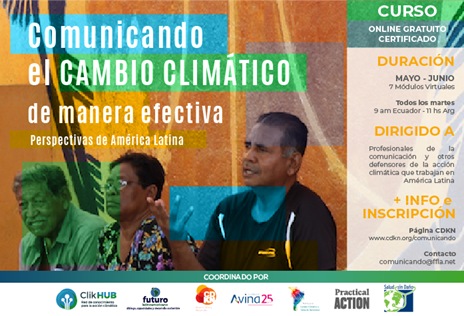
The five projects are outlined here, looking at each project’s focus, activities, materials produced and some reflections from the implementation teams.
-
‘Local places working for climate and water’ (Ecuador)
The communication campaign called Local Places Working for the Climate (where ‘local places’ is described as ‘territorios’ in Spanish) is a continuation of a project called Local Places Free from Uncontrolled Fires that was created in 2020 by the Arcoiris Ecological Foundation in the Quilanga and Espíndola cantons of Loja province, in southern Ecuador.
In the second phase, the Loja canton was included in the campaign. The aim was to raise awareness of uses of water in the Podocarpus – El Cóndor Biosphere Reserve and of the deterioration of river basin conditions due to agricultural activities, such as slash-and-burn agriculture.
The first phase of the project had focused on responsible fire management, targeted at women and young people. This second phase developed a series of materials to address three major opportunities:
- to capitalise on experiences from the responsible management of fire project and to create a communication package called Fire – Water.
- to generate local learning opportunities for young people (mainly women), on the management of communication campaigns for climate.
- to communicate the perceptions (disaggregated by gender) of the main impacts of climate change and access to water in the three cantons of the Podocarpus El Cóndor biosphere reserve.
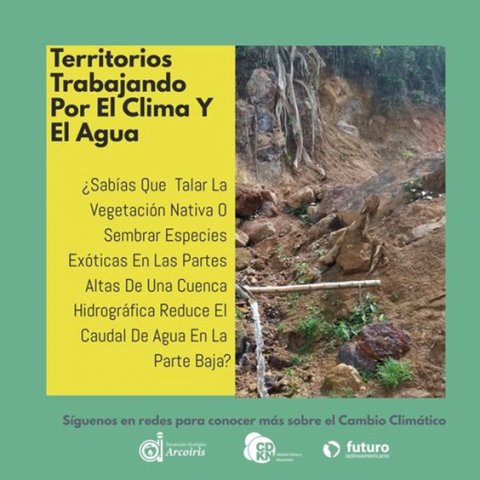
Materials developed in the project
-
Video about integrated management of water resources in the region (7 minutes)
- Radio announcements covering issues related to water and fires
- Infographics: i) integrated water management in the area and ii) a timeline of the ‘workplace’ fires.
- Channels for raising awareness and capacity building
- Graphics for social media (online campaign, Ecuador)
- Online workshop: Regions working on climate and water issues
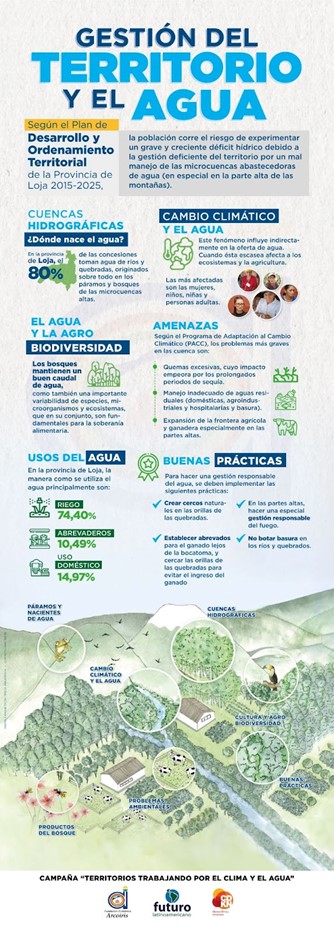
Follow the Climate and Water campaign on social media #FondoSemilla #Ecuador
The following was achieved during this short period of work:
- Raising awareness of climate change, gender and water management in rural communities. This has been measurable through the increase in social media engagement and followers.
- Unpacking the effects of climate change in the region from the perspective of the local people’s experiences.
- Placing the issue of gender on the agenda from various angles to show that in rural areas it is still incipient and invisible.
- Forging new alliances.
Reflecting on the lessons learned from the project, Judith Borja-González from the Arcoiris Ecological Foundation says that the ‘main lesson is internal’. Thanks to this project “the issue of communication has been raised in the organisation and we now understand that, although we can do great work in the field, if we don't know how to communicate it the work stays in small circles. We learnt that we can reach a lot more people through better communication strategies.”
Find more about this project on Facebook Fundación Arcoiris:
https://www.facebook.com/arcoirisur.ecuador
2. ‘One River, Many Waters’ (Argentina)
In Chubut province (Argentina), the project aimed to draw up a plan for effective communication of the climate change impact on water, and to raise awareness of the significant gender inequalities associated with water use and management in Patagonia and in particular the Lower Valley of the Chubut River.
In this phase of the project, we aimed to learn about women’s perceptions of the environment and existing gender gaps in the context of water management. This made it possible to strengthen awareness-raising and knowledge exchange in relation to climate change and its socio-environmental impacts. There was a shift from reporting on the reporting of social and environmental impacts of climate change, to including learning about people’s perceptions, so strengthening their ability to adapt.
Overall, this contributed to the implementation of effective climate actions (in this region) that now include a gender perspective.
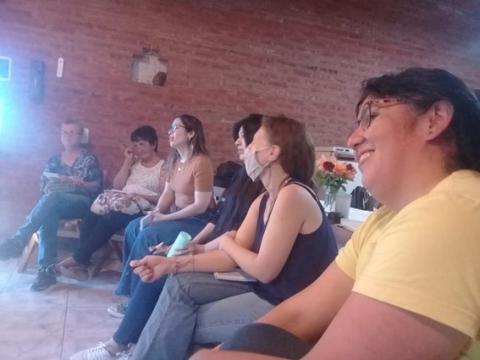
The geographical reach for communicating new scientific findings was expanded, in Patagonia, and young people were included as a new audience. The intention was to share scientific findings with the next generation, who will soon be making decisions on water use and integrated water management.
An interdisciplinary team of researchers, communicators, designers and an organisation specialising in diversity produced the materials together.
Materials developed in the project
- Extension of the existing communications toolbox with two infographics
- Audio-visual material
- "Women of the water" meeting
- Educational materials for schools.
Reflecting on the lessons learned during the project the team highlighted the fact that it managed to show the relationship between the environment and gender, which is new for the region.
It was also important that the project demonstrated, as Daniela Raguileo mentions, that “the common perception is that climate change is not happening now, it is rather perceived as something of the future or as something happening in another part of the world”. It is therefore essential to continue working on this issue and raising awareness of the tangible and immediate effects that climate change is having.
Find more information at @lasaguasdelrio; www.unriotodaslasaguas.com.ar
Follow the campaign on social media #FondoSemilla #Argentina
3.‘Young people as key actors to tackle climate change in the City of Iquitos’ (Peru)
The project team set out not only to raise awareness within a group of young people from Iquitos through training, but also to encourage them to become agents of change and climate ambassadors, equipping them with the tools to educate others on the climate crisis and involve them in the development of solutions.
This involved addressing three pillars:
- Strengthening climate change leadership through providing training on issues related to: increases in temperatures and cold weather, floods, droughts, hurricanes, diseases and displacement, as well as the introduction of communication strategies and practices.
- Promoting climate action. This involved a follow up of the process of planting flood-resistant trees that was started in the first stage. Neighbours and children from the area were involved in this activity.
- Young people as key actors in climate communication
- Creating educational material to support young people so that they can train other young people.
- Participation of young people in a local seminar.
- Participation of young people in an international seminar.
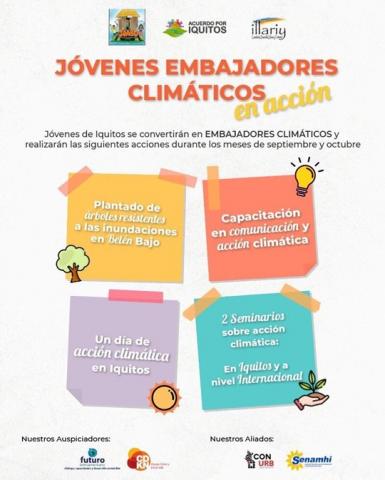
Materials developed in the project
- Six infographics on the climate change risks in Iquitos.
- A video about the climate change risks in Iquitos – narrated by two youths from the area who participate as climate ambassadors from the project.
- A campaign using the main messages from the youth on climate action
- A video of a presentation given by the local climate ambassadors at a climate event.
These materials will form part of an open toolbox where young people can access information on climate change and the Iquitos experience. In addition, a Facebook group was created where the videos of the training processes are posted.
A two-day international seminar was held (Day 1 - Day 2) to highlight these issues and materials. A local seminar was also held on nature-based solutions for resilient cities and local strategies for tackling the climate crisis; and highlighting the experience of the youth of Iquitos on climate action.
Project implementer Maritza Mayo shared her reflections on the project, saying that "training young people as agents of change is a complex process and a better understanding is needed of local stakeholders and the local situation”. She noted that its achievements included making links among youth groups. Also, there was unexpected interest from groups such as the Peruvian Army, the Peruvian University of the Amazon and the Urban Planning, Governance and Social Housing Research Group from the Pontifical Catholic University of Peru (PUCP). Despite the challenges posed by Covid-19, which prevented face-to-face gatherings, the new climate ambassadors gave positive feedback on their experiences.
Follow the Iquitos climate campaign on social media #FondoSemilla #Perú
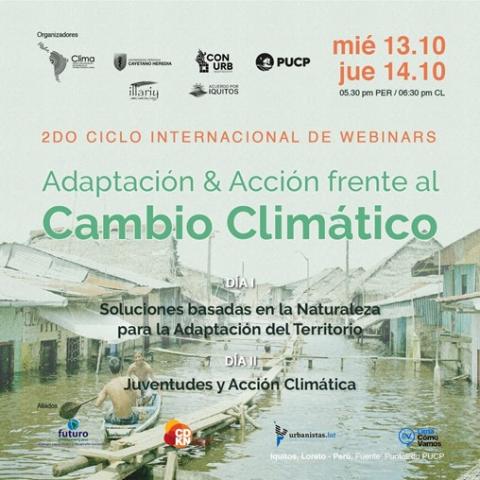
4. ‘Portraits of the countryside: Gender, coffee and mountains’ (Colombia)
The Climalab team successfully created their first documentary called Portraits from the Field: Women of Earth and Water. It was released in October 2020 and it has had a great reception
In the second phase of their communications project, the team set out to expand on work that focussed on the relationship between gender, rural life and climate change in Colombia. Their second documentary is called: Portraits of the Countryside: Women, Coffee and Mountains. It was shot in Urumita and Serranía del Perijá, south of La Guajira, on the Caribbean coast. This is the second film in a series of six that will cover all the regions in Colombia.
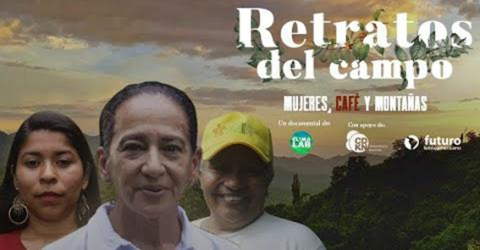
Materials developed in the project
- The documentary film itself
- The documentary trailer
- An online campaign with related articles over time
- A premiere of the documentary at the Royal Films, C.C. San Martin Bogota.
- A press release linked to a communication strategy developed through partnerships with media channels.
This project has played a role in raising awareness of the realities, challenges and opportunities in the rural context of the Caribbean region. It has also ensured that the documentary reached far and wide on social network platforms. It was shared by various organisations and media channels making way for opportunities to participate in festivals and to reach new audiences.
Executive director of Climalab, Alejandra Tellez, says that this second experience of film making, “the quality is better and so is our self-reflection and teamwork, I am so proud of the team, we are all under 30 years of age and we have achieved something very interesting. The revolution in climate action is from us young people”.
The documentary was released during COP26, and it shows that what is debated at an international level is relevant and has an impact on a local level.
Follow the campaign of the Documentary Portraits of the Field on social media #FondoSemilla #Colombia
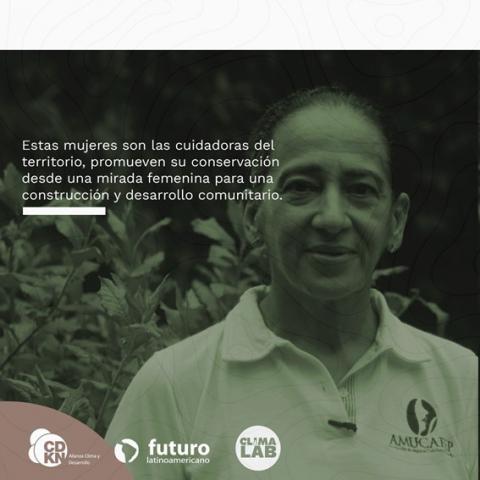
5. ‘Breathable: Children of a new wind’ (Chile)
In the first phase of the project the idea for Breathable: Children of a New Wind was conceptualised and developed. This took the form of investigative journalistic (T.V.) mini-series produced for children. The mini-series discusses industrial activity in the Quintero and Puchuncaví Sacrifice Zone and the impact it is having on the lives of local children and youth. The series focussed on children and youth not only as victims, but also as active participants in developing solutions to the problem.
The series was well received by the media, the audience, (local) authorities and experts in the field, however, the project team would still like the series to reach a wider audience.
Therefore the project’s second phase aimed to get the series out in the media and into schools, to have a bigger impact on children, adolescents and decision-makers. The team created an online platform with an interactive tour through theoretical, practical and fun materials for education on climate change and sacrifice zones – this is aimed at children from 1st to 4th year of basic education in Chile.
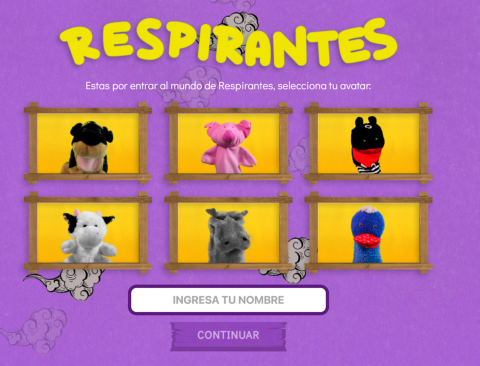
The platform covers five major topics: climate change, sacrifice zones, children's rights, impacts on health and agency. Children choose their avatar and then navigate between three games or activities.
Materials developed in the project
- An interactive online platform with three games and activities.
- A gathering in the Suyai Garden in Quintero where the series and the online platform were premiered and a poster-making workshop was held for 18 children aged 6 and 11. These included the main characters from the series.
Follow the Breathable campaign on social media #FondoSemilla #Chile
Putting gender on the agenda: lessons learned
The five projects have provided for a rich exchange of experiences and learning. This has highlighted some commonalities among them.
The team in Ecuador found that people in rural communities are aware of climate change, because they see its impacts. Being connected to nature, rural people have a direct experience of climate change.
However, this openness does not apply to gender issues. There is a notable resistance to incorporating gender dimensions and acknowledging the differentiated way in which climate change (and its solutions) affect women and men. This project helped open our eyes to the intersecting impacts that climate change and the misuse of resources have on women.
As Judith Borja-González says, "the issue of gender has left us very concerned and if we want to work on climate change we must definitely work on gender and vulnerable populations." She also added that "we usually tackle the gender issue more remotely, but this experience has showed us that working with gender is multi-faceted and we can be done close to home and in a tangible way."
When working on climate change and gender, the issues need to be communicated in a way that is relatable to people’s everyday concerns. In Ecuador, these issues are new and difficult to understand. This made it difficult to reach out to women and young people explicitly to discuss these issues via workshops.
Therefore, the team held workshops on topics related to women’s normal daily activities, such as managing their vegetable gardens. This attracted women to the workshops, which covered gardening and then explored other topics.
In the Colombian project, where a film was made in collaboration with a women's coffee cooperative, the experience helped the Climalab team understand how the community feels. In most cases, organisations do site work to find out about the experiences of community members then they record this and leave but do not return with the results. In this case, those who participated in the documentary were invited to attend the film premiere in Bogotá. So, the community was involved in the results and, as Alejandra Téllez from Climalab indicates, "this was very valuable”.
It is imperative that when working with women from rural communities, they are invited to get involved in the project’s outputs and have a sense of the tangible results coming out of a project.
Gabriela Villamarín from Fundación Futuro Latinoamericano and CDKN remarked that overall, through the second phase of these climate communications projects “these experiences have strengthened capacities within the organisations and abroad. The project impacts are visible in the neighbourhoods, communities and schools where vulnerable rural groups have been reached. Their voices have been heard, and awareness has been raised through inking climate change with issues in their daily lives. This shows that with just a few resources, it is possible to effect changes and promote climate action at a local level and with a gender perspective”.
